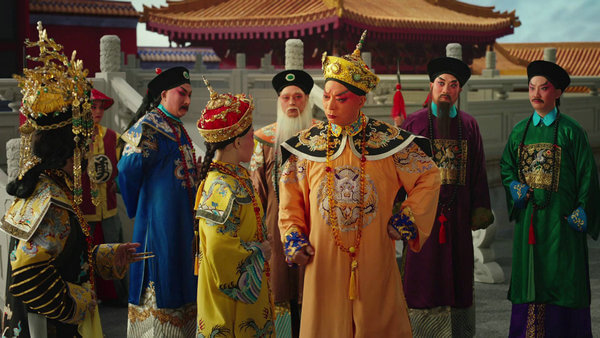Lady Mi was a younger sister of Liu Bei’s associate Mi Zhu who arranged a marriage between her and Liu Bei after Liu Bei’s wife or wives and children had been captured by Lü Bu in 196. Wikipedia

Sun Hao (243 – January or February 284), courtesy name Yuanzong, originally named Sun Pengzu with the courtesy name Haozong, was the fourth and last emperor of the state of Eastern Wu during the Three Kingdoms period of China. Wikipedia

Zhuge Liang, courtesy name Kǒngmíng was a Chinese statesman and military strategist. He was chancellor and later regent of the state of Shu Han during the Three Kingdoms period. He is recognised as the most accomplished strategist of his era, and has been compared to Sun Tzu, the author of The Art of War. Wikipedia

Cao Hong, courtesy name Zilian, was a Chinese military general of the state of Cao Wei during the Three Kingdoms period of China. He started his career in the late Eastern Han dynasty under the warlord Cao Cao, who was his older second cousin. Wikipedia

Jiang Wei, courtesy name Boyue, was a military general of the state of Shu during the Three Kingdoms period of China. Born in Ji County, Jiang Wei started his career as a military officer in his native Tianshui Commandery, which was a territory of Wei. Wikipedia

Yuan Shao, courtesy name Benchu, was a Chinese military general, politician, and warlord who lived in the late Eastern Han dynasty. He occupied the northern territories of China during the civil wars that occurred towards the end of the Han dynasty. Wikipedia

Zhang Zhao, courtesy name Zibu, was a Chinese calligrapher, essayist, military general, and politician. He served as an official of the state of Eastern Wu during the Three Kingdoms period of China. Wikipedia

Dong Zhuo, courtesy name Zhongying, was a Chinese military general, politician, and warlord who lived in the late Eastern Han dynasty. At the end of the reign of the Eastern Han, Dong Zhuo was a general and powerful minister of the imperial government. Wikipedia

Zhuge Jin, courtesy name Ziyu, was a Chinese military general and politician of the state of Eastern Wu during the Three Kingdoms period of China. Wikipedia

Emperor Xian of Han, personal name Liu Xie, courtesy name Bohe, was the 14th and last emperor of the Eastern Han dynasty in China. He reigned from 28 September 189 until 11 December 220. Liu Xie was a son of Liu Hong and was a younger half-brother of his predecessor, Liu Bian. Wikipedia

Hua Tuo, courtesy name Yuanhua, was a Chinese physician who lived during the late Eastern Han dynasty. The historical texts Records of the Three Kingdoms and Book of the Later Han record Hua Tuo as the first person in China to use anaesthesia during surgery. Wikipedia

Pang Tong, courtesy name Shiyuan, was a key adviser to the warlord Liu Bei in the late Eastern Han dynasty of China. In his youth, Pang Tong was disregarded because he was plain looking, however Sima Hui highly esteemed him calling him the “Crown of Scholars in Jing Province”. Wikipedia

Huang Gai, courtesy name Gongfu, was a military general who served under the warlord Sun Quan during the late Eastern Han dynasty of China. He previously served under Sun Quan’s predecessors – Sun Jian and Sun Ce. Wikipedia





can you identify an artist if I send you a photo of his ricepaper scroll art? Chinese I believe.
I was studying some of your articles on this
site and I think this website is really instructive!
Keep on posting.Raise your business
Very interesting topic, regards for putting up.Raise your business